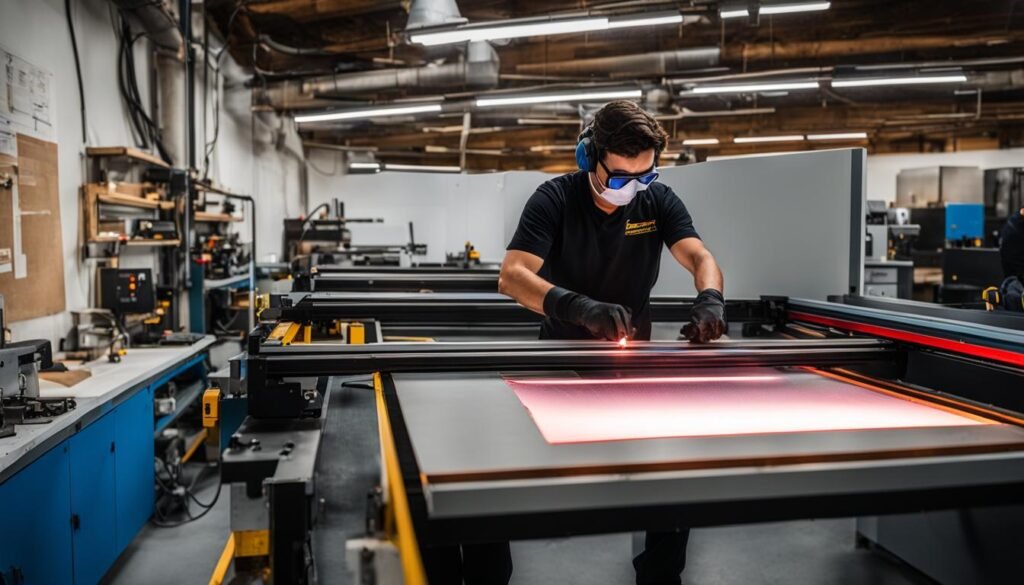Contents
- 1 Key Takeaways:
- 2 Laser Jobs in Engineering and Manufacturing
- 3 How to Start a Career in Laser Jobs
- 4 Trends and Innovations in Laser Jobs
- 5 In-Demand Laser Jobs in Skincare and Healthcare
- 6 Conclusion
- 7 FAQ
- 7.1 What are some in-demand laser jobs in skincare and healthcare?
- 7.2 What do skincare specialists and dental hygienists do with lasers?
- 7.3 What roles do registered nurses and surgical technologists play in laser jobs?
- 7.4 How do ophthalmologists utilize lasers?
- 7.5 What are some laser jobs in engineering and manufacturing?
- 7.6 What tasks do welders perform with lasers?
- 7.7 What do photonics engineers and mechanical engineers do in laser jobs?
- 7.8 What is the role of laser operators?
- 7.9 How are automotive technicians involved in laser jobs?
- 7.10 What are some pathways to start a career in laser jobs?
- 7.11 What are some trends and innovations in laser jobs?
- 7.12 What is laser engraving and how does it work?
- 7.13 What are the materials suitable for laser engraving?
- 7.14 What safety considerations and regulations should be followed in laser engraving?
- 7.15 How can I explore different types of laser jobs?
- 8 Source Links
In this comprehensive guide, we will take a deep dive into the different types of laser jobs available today. From skincare specialists to photonics engineers, we will explore a range of exciting and in-demand careers in the laser industry. Discover the educational requirements, average salaries, and projected job growth for each profession, as well as how to break into this promising field.
Key Takeaways:
- There are various laser jobs available in different industries, including skincare, healthcare, engineering, and manufacturing.
- Skincare specialists, dental hygienists, registered nurses, surgical technologists, and ophthalmologists are some of the in-demand laser jobs in the skincare and healthcare fields.
- Engineering and manufacturing industries offer laser jobs such as welders, photonics engineers, mechanical engineers, laser operators, and automotive technicians.
- Starting a career in laser jobs can be achieved through trade programs, vocational training, college degrees, or becoming a certified laser safety officer.
- The laser industry is constantly evolving, with trends and innovations like laser therapy for Alzheimer’s disease and advances in laser technology shaping the field.
Laser Jobs in Engineering and Manufacturing
When it comes to laser jobs, the engineering and manufacturing industries offer a diverse range of opportunities for skilled professionals. From welders to photonics engineers, there are various roles that require expertise in laser technology. Let’s take a closer look at some of the laser jobs in these fields:
Welder
A welder is responsible for using handheld lasers to perform precise and efficient welding tasks. They work with different materials and utilize lasers to create strong and durable welds. In addition to welding, welders also perform inspections and ensure the quality of their work. The average salary of a welder is around $45,000 per year, and job growth in this field is projected to be steady.
Photonics Engineer
Photonics engineers are at the forefront of laser technology development. They design and improve laser systems, focusing on areas such as optics, lasers, and electronics. Photonics engineers work on projects that involve laser-based applications, such as telecommunications, medical devices, and manufacturing processes. With an average salary of $90,000 per year, this field offers lucrative opportunities for those with a strong background in engineering and optics.
Mechanical Engineer
Mechanical engineers play a crucial role in the development and implementation of laser technology in various industries. They design and test laser systems, ensuring their efficiency and reliability. Mechanical engineers also work on projects related to laser-assisted manufacturing, laser cutting, and laser-based instrumentation. The average salary for a mechanical engineer is around $88,000 per year, and job prospects in this field are expected to be favorable.
Laser Operator
Laser operators are responsible for operating and supervising laser cutter machines in manufacturing facilities. They ensure that the machines are set up correctly, monitor the laser cutting process, and make adjustments as needed. Laser operators also perform routine maintenance and troubleshooting to keep the machines running smoothly. The average salary for a laser operator is approximately $35,000 per year, and there are good job opportunities in this field.
Automotive Technician
With advancements in laser technology, automotive technicians are increasingly working with lasers in car production. They use lasers for tasks such as welding, cutting, and trimmings, ensuring precision and efficiency in the manufacturing process. Automotive technicians with laser expertise are in high demand, and the average salary in this field is around $45,000 per year.
These are just a few examples of laser jobs in the engineering and manufacturing industries. Whether you’re interested in working with lasers in welding, engineering, or automotive applications, there are opportunities available for skilled professionals in this growing field.

How to Start a Career in Laser Jobs
If you’re interested in pursuing a career in laser jobs, there are a variety of pathways you can take to enter this exciting field. Whether you prefer hands-on training or a formal college education, there are options available to suit your preferences and goals. Here are some of the main routes to consider:
1. Laser Job Training and Trade Programs
Trade programs and vocational training offer a practical and direct approach to starting a career in laser jobs. These programs typically provide hands-on training and focus on developing the skills needed for specific laser-related professions. Some trade programs even offer specialized tracks for specific industries, such as skincare or manufacturing. Completing a trade program can give you a solid foundation and make you more competitive in the job market.
2. College Degrees in Related Fields
If you’re interested in research or engineering roles within the laser industry, pursuing a college degree in a related field can open up a world of opportunities. Degrees in fields such as photonics, mechanical engineering, or electrical engineering can provide you with the necessary knowledge and skills to excel in laser-related professions. Additionally, some colleges offer specific laser-focused programs or concentrations within these broader fields, allowing you to specialize in laser technology and applications.
3. Laser Safety Officer Certification
In industries where laser safety is a critical concern, such as manufacturing and healthcare, becoming a certified laser safety officer can enhance your career prospects. Laser safety officer certification programs provide comprehensive training on laser safety regulations, protocols, and best practices. By obtaining this certification, you demonstrate your commitment to ensuring a safe working environment and your expertise in laser safety procedures.
Summary
Starting a career in laser jobs offers a range of possibilities, from trade programs for hands-on training to college degrees for research and engineering roles. Depending on your interests and goals, you can choose the path that best suits you. Additionally, obtaining a laser safety officer certification can provide an added advantage in industries where laser safety is of utmost importance.

Trends and Innovations in Laser Jobs
The laser industry is constantly evolving, and staying informed about the latest trends and innovations is crucial for those pursuing laser jobs. One exciting development is the potential use of laser therapy in treating Alzheimer’s disease, which could offer new hope to patients. Advances in laser technology, including improved precision and efficiency, continue to shape the industry. Discover the latest trends and innovations in laser jobs that are driving the future of this field.
One of the emerging trends in laser jobs is the exploration of laser therapy as a potential treatment for Alzheimer’s disease. Laser therapy, also known as photobiomodulation, involves applying light of specific wavelengths to targeted areas of the brain to stimulate neural activity and enhance cognitive function. While still in the early stages of research, preliminary studies have shown promising results in improving memory and reducing cognitive decline in individuals with Alzheimer’s disease. This innovative approach has the potential to revolutionize the treatment options available for this debilitating condition.
“Laser therapy has shown great promise in enhancing neural activity and potentially slowing down the progression of Alzheimer’s disease. It offers a non-invasive and targeted approach to neurostimulation, which could have significant implications for patients and their families.”
Advances in Laser Technology
Advancements in laser technology continue to drive innovation in various industries. Laser systems are becoming more precise, efficient, and versatile, leading to improved performance and expanded applications. For example, in the field of manufacturing, lasers are now used for cutting, welding, and marking with greater accuracy and speed. In the medical field, lasers have enabled minimally invasive procedures and enhanced surgical capabilities. Additionally, the development of compact and portable lasers has made them more accessible for a wider range of applications, including research, education, and consumer electronics.
“The continuous advancements in laser technology have opened up new possibilities across industries, making processes more efficient and enabling the development of innovative products and treatments. From microscale precision to macro-scale applications, lasers are driving progress and shaping the future of various fields.”
In-Demand Laser Jobs in Skincare and Healthcare

Skincare specialists, dental hygienists, registered nurses, surgical technologists, and ophthalmologists are just a few of the laser jobs in high demand in the skincare and healthcare industries. Skincare specialists use lasers for treatments such as hair removal and skin resurfacing, while dental hygienists may use lasers in oral surgeries. Registered nurses and surgical technologists play critical roles in ensuring laser safety during medical procedures. Ophthalmologists utilize lasers for vision correction surgeries like Lasik.
These laser jobs require individuals with specialized skills and knowledge in their respective fields. Let’s take a closer look at each profession:
1. Skincare Specialist
Skincare specialists, also known as estheticians, work in spas, salons, and dermatology clinics. They use lasers for various cosmetic and therapeutic treatments to improve the condition of the skin. These treatments can include laser hair removal, laser skin rejuvenation, and laser tattoo removal. Skincare specialists must have a strong understanding of skincare science and be proficient in operating laser devices safely and effectively.
2. Dental Hygienist
Dental hygienists are responsible for assisting dentists in providing oral healthcare services. In laser dentistry, dental hygienists may use lasers for procedures such as periodontal therapy, cavity detection, and oral surgeries. They must have a solid foundation in dental hygiene practices and be trained on the proper use of laser technology in dental settings.
3. Registered Nurse
Registered nurses (RNs) are integral members of the healthcare team, providing direct patient care and assisting in medical procedures. In laser jobs, RNs play a crucial role in ensuring patient safety during laser treatments and surgeries. They monitor vital signs, administer anesthesia, and assist with the operation of laser devices. RNs interested in pursuing laser jobs may consider specializing in dermatology or plastic surgery.
4. Surgical Technologist
Surgical technologists, also known as operating room technicians, work alongside surgeons, nurses, and other healthcare professionals during surgical procedures. In laser surgeries, surgical technologists assist in the setup and operation of laser devices, ensuring proper positioning and safety measures. They are responsible for maintaining sterile conditions and monitoring equipment during surgeries.
5. Ophthalmologist
Ophthalmologists are medical doctors specialized in eye care. They diagnose and treat various eye conditions and perform surgeries, including laser eye surgeries like Lasik and PRK. Ophthalmologists use lasers for precise vision correction, helping patients achieve clearer vision and reduce dependency on glasses or contact lenses. These procedures require a high level of proficiency and expertise.
These laser jobs in skincare and healthcare offer rewarding career opportunities for individuals passionate about helping others and working with advanced technology. The demand for these professionals is expected to continue growing as laser technology becomes more integral to medical and aesthetic treatments.
Conclusion
In this comprehensive guide, you have explored the different types of laser jobs available today. From skincare specialists to photonics engineers, the laser industry offers a wide range of exciting career opportunities. Whether you are interested in healthcare, engineering, or manufacturing, there are paths to enter this growing field.
By delving into the educational requirements, average salaries, and job growth projections for each profession, you have gained valuable insights into the laser industry’s promising future. Additionally, you have learned about the various pathways to starting a career in laser jobs, including trade programs, college degrees, and specialized certifications like laser safety officer certification.
It’s important to stay informed about the latest trends and innovations in laser jobs as the industry continues to evolve. Advances in laser technology, such as laser therapy for Alzheimer’s disease, are driving the future of this field. Remember to prioritize safety when working with lasers, following guidelines and regulations to protect yourself and others from potential hazards.
Now that you have explored this comprehensive guide, you are well-equipped to explore the possibilities and embark on your journey towards a rewarding career in the diverse and exciting world of laser jobs.
FAQ
What are some in-demand laser jobs in skincare and healthcare?
Skincare specialists, dental hygienists, registered nurses, surgical technologists, and ophthalmologists are just a few examples of laser jobs in high demand in these industries.
What do skincare specialists and dental hygienists do with lasers?
Skincare specialists use lasers for treatments like hair removal and skin resurfacing, while dental hygienists may use lasers in oral surgeries.
What roles do registered nurses and surgical technologists play in laser jobs?
They play critical roles in ensuring laser safety during medical procedures.
How do ophthalmologists utilize lasers?
Ophthalmologists utilize lasers for vision correction surgeries like Lasik.
What are some laser jobs in engineering and manufacturing?
Welders, photonics engineers, mechanical engineers, laser operators, and automotive technicians are some laser jobs in these industries.
What tasks do welders perform with lasers?
Welders may use handheld lasers for precise and efficient welding.
What do photonics engineers and mechanical engineers do in laser jobs?
They design and improve laser technology.
What is the role of laser operators?
Laser operators are responsible for operating and supervising laser cutter machines in manufacturing facilities.
How are automotive technicians involved in laser jobs?
They are increasingly working with lasers in car production for tasks like welding and trimmings.
What are some pathways to start a career in laser jobs?
Trade programs, vocational training, college degrees in fields like photonics and mechanical engineering, and becoming a certified laser safety officer are some pathways to enter the field.
What are some trends and innovations in laser jobs?
Laser therapy for Alzheimer’s disease and advances in laser technology, including improved precision and efficiency, are some exciting developments shaping the industry.
What is laser engraving and how does it work?
Laser engraving is a non-contact process that uses a laser beam to vaporize and remove material, creating markings on various materials in a controlled pattern.
What are the materials suitable for laser engraving?
Materials such as marble, wood, glass, metal, acrylic, and fabric are suitable for laser engraving.
What safety considerations and regulations should be followed in laser engraving?
Proper ventilation and the use of protective eyewear are important safety considerations. Certain materials, such as PVC, PVB, and materials containing halogens or epoxy resins, should be avoided due to the release of toxic fumes when laser engraved.
How can I explore different types of laser jobs?
By reading this comprehensive guide, you have already explored a variety of laser jobs in different industries, including skincare, healthcare, engineering, and manufacturing. This guide provides information on educational requirements, average salaries, projected job growth, and how to start a career in laser jobs.



